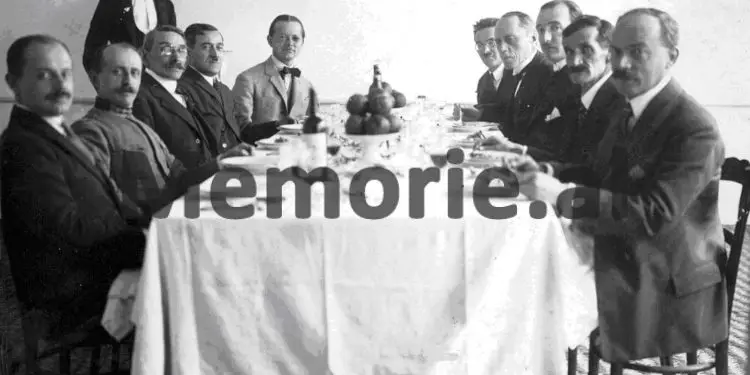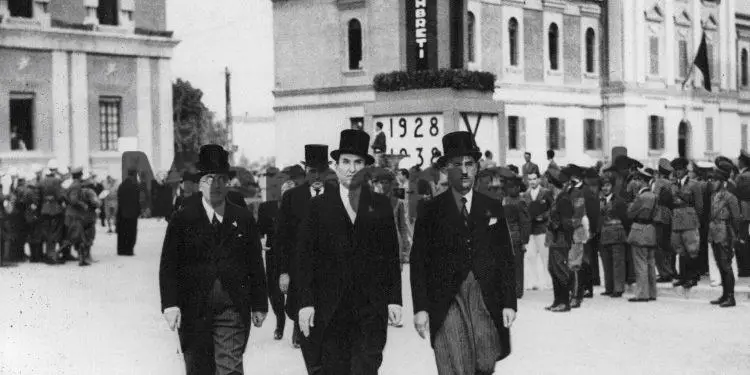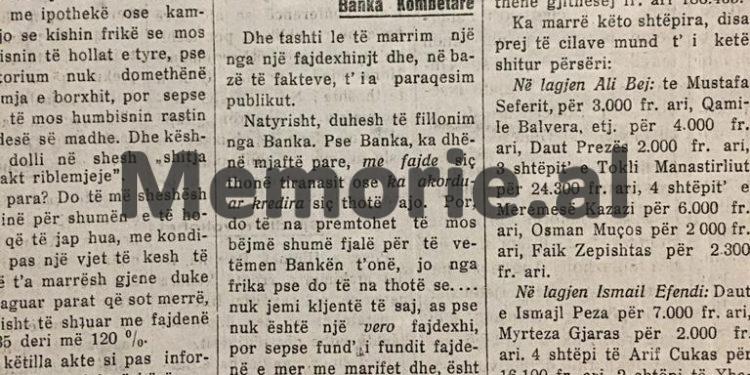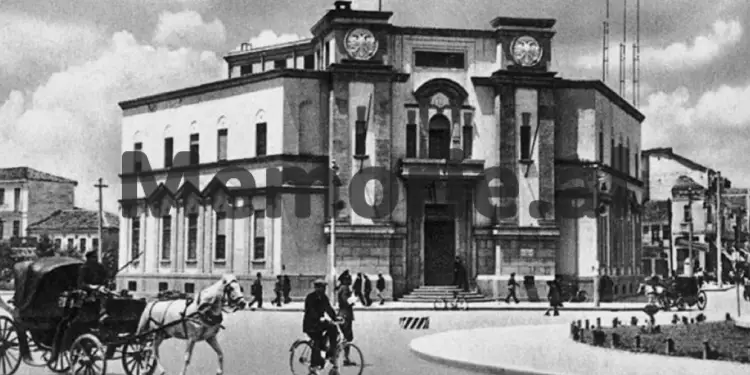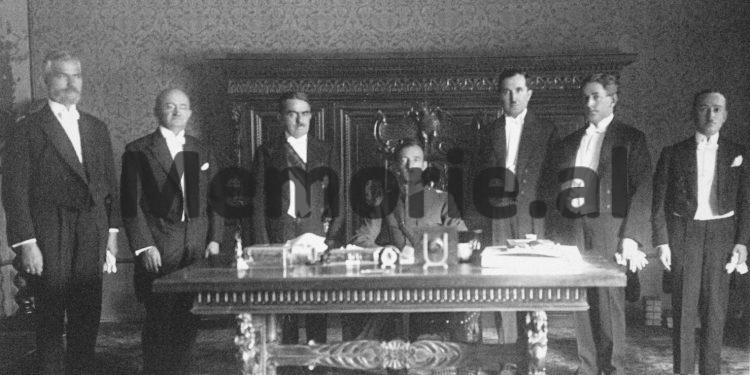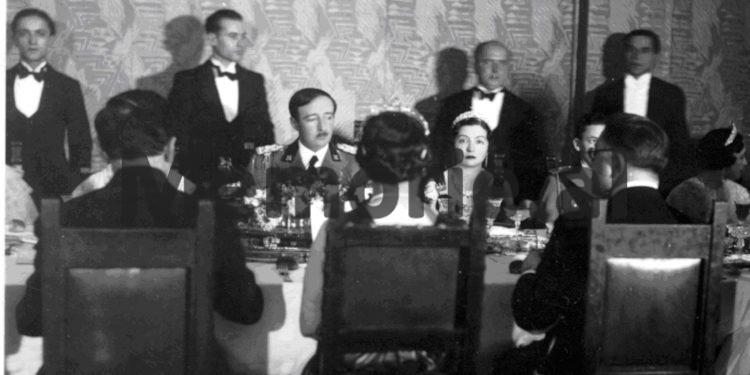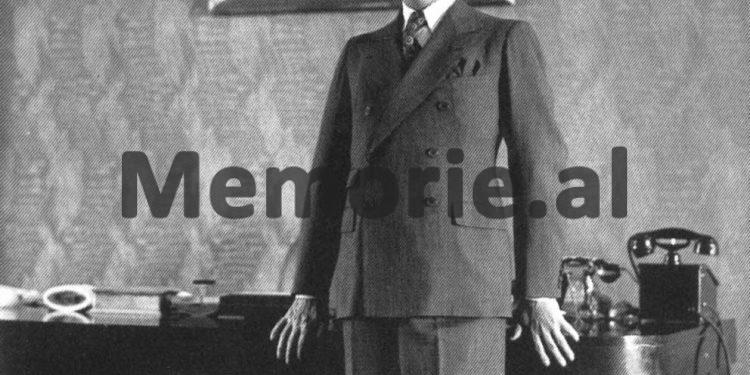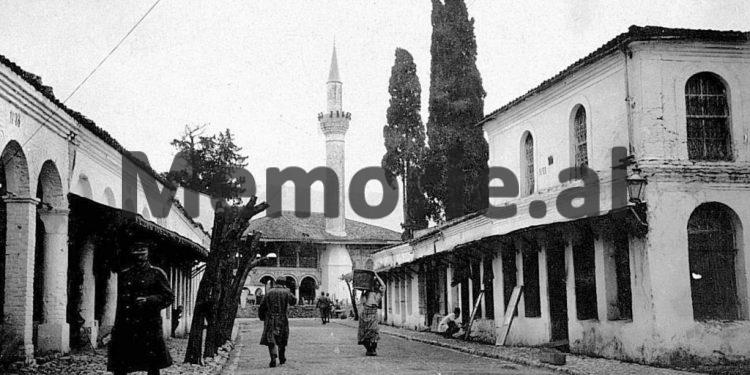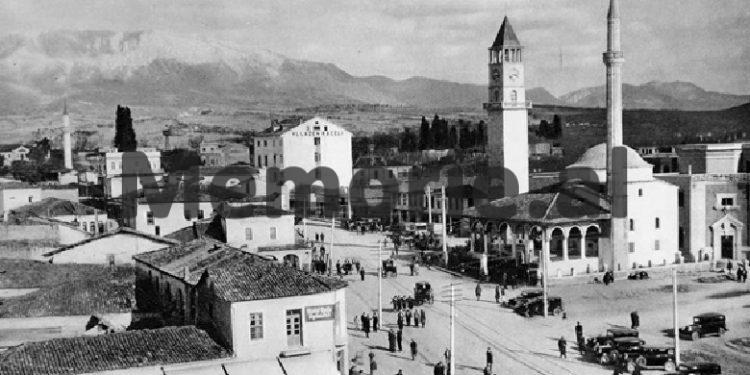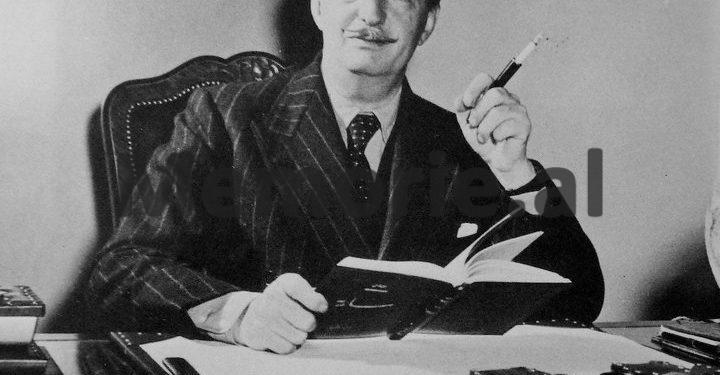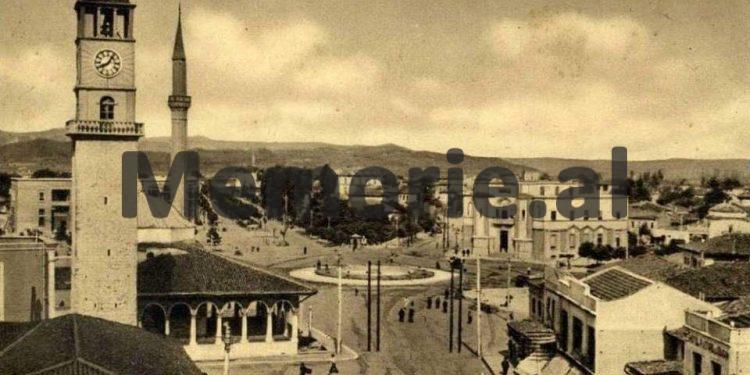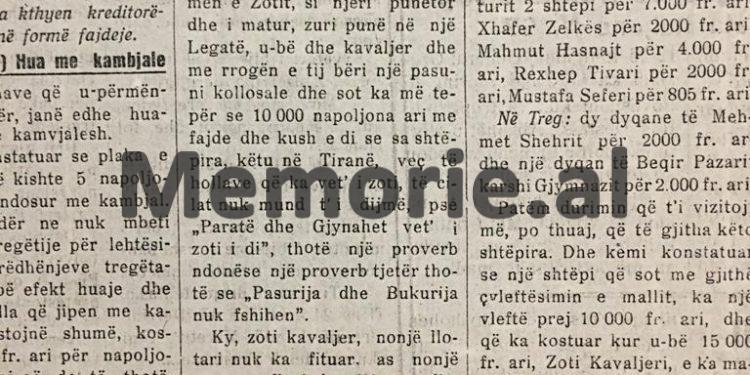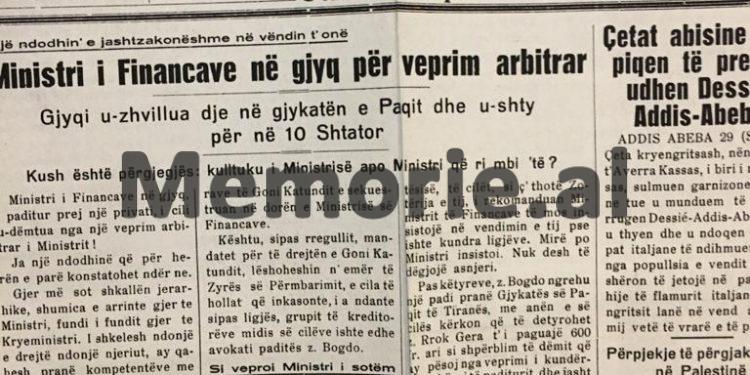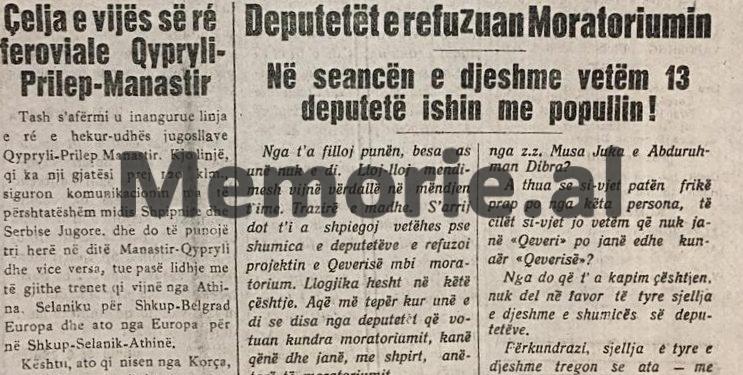Dashnor Kaloçi
Memorie.al publishes the unknown history of usury flourishing in the period of the Zog Monarchy, where many traders and various owners from Tirana and some other cities of Albania, due to the desire to get rich as soon as possible, lost all their assets. Theirs. How did Gjon Rasku and Guljelm Luka from Shkodra and Jorgji Hobdari make a profit with usury who took money for usury for the soap factory and Petro Dancika, the famous usurer, who, together with his wife, took the houses, shops and properties from the tyrants the others, with a value reaching 1 million gold francs? List the names of the tyrants and the houses and properties they left in usury.
During the period of the Zog Monarchy, or more precisely somewhere from 1935-36, when the Albanian economy was taking steps forward and the country was moving at a rapid pace of development, which was conditioned by the very modern legislation and quite advanced for the time. , from which a series of economic agreements of Albania’s mutual trade with Italy and some other countries flowed, just at that time a phenomenon spread with a dizzying speed, or better to say a very negative “epidemic”, as they were usury. Out of a desire to get rich quickly, many traders, homeowners, shopkeepers, or factory owners, as well as ordinary people, took advantage of usury by signing notarial contracts, promising to wash them with enough interest. high repayment. But most of them could never repay the money, so they forced the usurers to return the properties, houses, shops, factories and workshops they had mortgaged. This phenomenon, ie the “usury epidemic”, which at that time had a very negative impact on the Albanian economy, in addition to the great pain it caused too many Albanian families who lost all their savings and property, leaving them to the usurers. , also caused a strong shock in the political class of that time. One of the biggest critics of that epidemic was the press of the time, where many newspapers followed in their front pages the reactions of ordinary people, which forced the political class of that time and the Parliament to consider the idea of a moratorium, where the giving of usurious money should be prohibited by law. For all this, in this article we are publishing some of the press articles of that time, where brave journalists, in addition to numerous analyzes of the problem of usury, have denounced with facts, figures and arguments the names of usurers who were stripping the people of simply, attaching to them a long list of the names of the victims of that negative phenomenon that erupted and flourished with dizzying speed in the years of the Bird Monarchy. We are publishing these writings without making any changes to the literary language of the period when they were written.
ARBNIA newspaper: How America considers usurers
In America, people with disabilities in human society, thieves and criminals, have been put out by a number. By the way, a thief named Deliger is no longer named after him. They gave it a name: “The enemy of the people Nr. 1 “. That is to say, the Americans find it a great crime to mention the name of a thief and instead of saying thief or robber Delinger, they say “Enemy of the people No. 1”. Of course, this Delinger is a criminal and the Americans rightly declared him an “enemy of the people.” What did he do? He has taken a rich man and robbed him of his money, that is, some of his money, and even after the robbery, the rich man is still rich and lives in this world for beauty. But if they, Delinger and friends, were characterized as such, how should our usurers be characterized? We said Delinger robbed a rich man of some money, but the rich man could live. Our usurers rob the people of Hallexhi, take their property and their last money and their honor, tear it down and make a living dead, and not just one person, but the whole family of the debtor, and those of the little ones who do not have no guilt… So how should we name these? “Enemies of the People?” And we’re going to put them in a number, just like they do in America for thieves, robbers, criminals. So the famous usurer will be mentioned today as the “enemy of the people No. 1” (Are you free to accept or not this decision of ours).
Silent tragedy
The man who will dare to enter the sufferings of this people must be very strong. He will understand there, the tragedy that even fantasy cannot capture. And how many such tragedies have taken place, in the great class of the people, in the Hallejians. And these tragedies take place in silence, in complete silence, and are therefore more tangible. Every heart is touched by these tragedies, and only the stony heart of the enemies of the people remains indifferent. When Nero saw that his victims were being torn apart by the savages, he laughed and drank and had fun, shouting, “Blood, more blood.” Our neurons, usurers, the enemies of the people, when they see their victims, the Hallejians who have killed them to death and force them to live like this, shout, “Money, more money!” And they laugh and have fun. Their souls… But they have no soul. They have sold their souls to Satan.
Jorgji Hobdari, usurious money for the soap factory
(A fantastic event) But a fantastic event, why didn’t it fill our minds that it might have really happened. Can they exist on this earth, which has a reputation for honest men who have given birth, can there be such heartless people? In 1931, it was the time of abundance and great commercial movement, Jorgji Hobdari, a graduate chemist and soap factory specialist, found that a soap factory would work well here, providing himself with a good livelihood and country of progress. There was no money needed, but there was wealth. There was a house where the National Bank is, which is worth more than 2500 napoleons. It took 900 napoleons to install the plant. He reckoned with it and concluded that he would be reimbursed if he took advantage of this money. He went here and there and finally found three people: Guljelm Luka, Gjon Rasku and Krajan. They gave 900 napoleons and for two years to pay 1250. How did he do the calculation? Here’s how: 900 napoleons for 18%, for one year, become 1062 and these for 18%, for another year become 1253. They forgive 3 napoleons and remain 1250. That is, they took usury on usury as well. This usury is too big for an industry. But the time of abundance, the desire to create, to progress, blinded George to accept, and the act was signed. Jorgji took the money and made the factory. 1932 came, the fatal year for the whole world. Ay didn’t start working well. The crisis that erupted that year shook the economic colossus. Jorgji Hobdari did not foresee this crisis, why, who foresaw it? Things did not go well and the deadline came, which he found without any money!
Creditors ask Hobdar for the money
(And they ravaged the house like crows). He went to the creditors and was told: The work did not work for me, give me another deadline. You don’t lose money, because you have a house worth more than 2,500 napoleons, on the other hand it will receive an advance from Bank 400 napoleons and so for two years we can wash. They did not accept. They demanded all the money. How to accept? They had the opportunity to get a house of 2,500 Napoli for 900. Soon the formalities and raids on the house like crows corpses. (And the Bank of the Soul) The desolate Hobdari prays, runs there, runs here. No one treats them. For a moment he imagines his and his family’s happiness flying, being forever separated, confused, lost I Creditors could hear nothing! He went to the Director of the Bank: “Aman to lower the rent”, save me, an advance for 6 years, to save the house, honor and family life, I have 5 people, small, incapable of work… And Bank Ban Eh, Bank! He could have saved him from the greed of his creditors, but he did not. “The Bank is not a charity” Creditors confiscated the money and continued the formalities of the seizures.
Hobdar has no money, he gives the house to his creditors
(And legal looting begins). Work came on to determine the value of the property. According to the law, a property is not sold if it does not realize its value. A quarter, the law forgives the usurer! Experts with great effort and, that found an honest and conscientious man, Ing. Pashollari, valued at 2000 napoleons. The desolate Hobdar opposes the expertise in the hope of gaining some time, who knows how to find a way out. And with Hobdar’s objection, another examination is made and the value is set at 1,700 napoleons. Now excluding the value, there are 1,275 napoleons left, who were legally entitled to offer creditors and take the house, that is, as long as they had the deed. And so it was, and they became masters of the house by law! Why were they rented out in advance and had the legal right to receive them? (Round account). And now let’s do the calculation. ZZ. Guljelm Luka, Gjon Rasku, and Kraja gave 900 napoleons. It took 400 napoleons for two years. 500 napoleons remained. How much does Jorgj Hobdar’s house cost you? A house that today is easily sold for 2,500 napoleons, why get 200 napoleons a year prepaid rent. (And now). Eh, now… Go to the end of “Nana Mbretneshë” street? There, a man who stands out in the society of Tirana as a prudent, as a host, as an intellectual, in a narrow chamber, has gathered his family piece by piece and lies with the hope that he has not lost everyone. And hopefully hooked? What? Have mercy on those who robbed her of happiness for 500 napoljona? In vain hope, they are not… ”Yes Mr. Hobdar, we told him when the speech ended, the state will help you, don’t worry. Even the press still. And the victim of the usurer kissed us!
New usury method: pact-repurchase loan
(The usurers, the people who have sold their souls to the devil. First and foremost – What did the debtor suffer). Benefactors were afraid to give out or cambial, not because they were afraid of losing their money because the moratorium would not mean postponing debt, but because they wanted to keep the case of big usury. And that’s how “selling with a repurchase pact” came to us. Do you want money? You will sell me the house for the amount of money I lend you, on the condition that after a year you have the right to take it again by paying me the money you receive today, of course, added with usury from 35 to 120%. Such acts, according to the information we have, have been made: the Year 1932 fr. gold 400,000, year 1933 fr. gold 200,000, 1934 fr. gold 300,000, year 1935 fr. gold 130,000. It is generally estimated that 400 properties have been sold during these years.
Accumulation of assets by usurers
These sums mentioned above are only in Tirana, let alone in Durrës, Vlora, and Korça. And if these properties had gone divided among many proprietary, it would not have mattered so much, but here in Tirana they have gone into the hands of two or three people, and if it were to post say 100 napoleons, 30 napoleons have gone. Thus, in addition to money, the property in the hands of usurers was collected, two or three people who today have the money they had, as well as the properties, while the other owners lost their properties without benefiting from their value, why even that money? when they received it, they returned it to the creditors twice in the form of usury.
800,000 fr. gold, loan with bill of exchange
In addition to the amounts mentioned above, there are also loan-based loans. We found that the old woman of the neighborhood who had 5 napoleons, placed them with a bill of exchange. The bill of exchange among us did not remain a trade effect for the facilitation of trade relations, but it became a foreign effect and this money given by the bill of exchange, costs a lot, costs 150 fr. gold for napoleon per month, which means 90%. And we have seen a bill of exchange that says… X received from an old woman 300 fr. gold in… merchandise. The amounts that have been given in cash with all the Bank’s loan amount, on the basis of an average account, to 800,000 fr. gold.
Who are the usurers?
According to a study we have done, the capital given in cash per year reaches hundreds of thousands of gold francs. The National Bank, together with Mr. Petro Danicka and others, 25% clerks, officers, officials and 15% elders and merchants. (National Bank) And now let’s take one of the usurers and, based on the facts, present it to the public. Of course we had to start with the Bank. Why has the Bank given a lot of money, with usury, as the tyrants say, or has it granted loans as it says? But we will be promised not to talk too much about our only bank, not out of fear that it will tell us that we are not its customers, nor because it is not a very (real) usurer, but because the end The latter takes the usury for granted and it is true that he does not say thank you, but at least he has a little soul and does not give money directly with 16%, but with 9 and 12%, which with commissions and costs reach 16%. There are a lot of words out there right now, and some of them may be true, but we’re going to leave it at that because we have more beautiful things.
Why doesn’t the Prime Minister and the Minister of Economy intervene?
(A proposal for the competent ministers) We do not know if the Minister of National Economy and the Prime Minister know these. Minister of Justice, if they don’t know, let them know now. Let us consider these revelations and charge a clerk to prove them, of course not the Secretary-General of the Ministry, that his lordship has a lot of work to do, as we shall discover below, and then if their souls hold it. , let them not make a moratorium. But even with an article, to order a review of the… robberies that have been committed…
Who were the tyrants who left their homes and property for usury?
After many articles in the newspaper “ARBNIA”, regarding the problem of usury, she also published the main usurer of Tirana, as well as a long list of traders and owners of Tirana who lost their property in usury. In that text, among other things, it was said: “With a salary, one does not become a rich man,” they say from the south. This is not true at all. If one is prudent and hardworking, honest, and hospitable, one can earn money and become rich. A vivid example is the cavalier Mr. Petro Dancika. His lordship in 1915, as those who know him say, had remained in a state of distress. Even his houses were still on fire. With God’s help, as a hardworking and prudent man, he regained a legacy, became a cavalier and with his salary made a colossal fortune, and today there are more than 10,000 gold napoleons with usury and who knows how many houses here in Tirana, except for the money that the master himself has, which we cannot know, because “Money and sins, only, God knows,” says one proverb, although another proverb says that “Wealth and Beauty are not hidden.” This cavalier gentleman, no lottery winner has won a single gold jar, has not found and half a million gold francs that he can have today has won with the sweat of his brow and his skill. Now, if, within 10-15 years, no matter how much a person sweats, he can earn less than half a million, this is another account. (Where the man loses the organ) Mr. Petro Dancika, both personally and through his wife, Mrs. Uranije, has greatly helped the Albanian Hallejians and has distributed his money in this way: Urania) a). With mortgage: 53,575 fr. gold b). Package-repurchase sale: 26,000 fr. gold. Amount 79,575 fr. gold. (vet ay). With the sale of 106,800 fr. gold, i.e. total fr. gold 186,435. He took these houses, some of which he may have sold again: In the Ali Bey neighborhood: of Mustafa Sefer, for 3,000 fr. gold, Qamile Balvera, etc. For 4,000 fr. gold, Daut Preza 2,000 fr. gold, 3 houses of Tokli Manastirli for 24,300 fr. gold, 4 houses of Meremes Kazazi for 6,000 fr. gold, Osman Muços for 2,000 fr. gold, Faik Zepishtas for 2,300 fr. gold. In the neighborhood of Ismail Efendi: Daut and Ismail Peza for 7,000 fr. gold, Myrteza Gjaras for 2,000 fr. gold, 4 houses of Arif Cukas for 16,000 fr. gold, two houses of Xhafer Keta for 2,150 fr. gold, Dylber Kazazi etc., for 2,000 fr. gold, Hamdi Muços for 4,000 fr. gold, Xhemal Reçi for 1955 fr. gold, Mahmut Këllezit 1 house, oven, 2 shops for 6,900 fr. gold, Shefqet e Halit Peshkopisë for 4,000 fr. gold. In the Sulejman Pasha neighborhood: Daut Barkanesh for 2,000 fr. gold, Ramiz Qyrlajt for 6,900 fr. gold, Hajrie Reçi for 1,200 fr. gold, Enver Toptan 1 trull with 2 shops for 5,450 fr. gold. In the new neighborhood: Ismajl Bylykut for 6,000 fr. gold, Hamdi Dashit 2 houses for 4,000 fr. gold, Qazim Hitaj for 2,000 fr. gold, Sulejman Troplinit for 2,000 fr. gold. In the neighborhood Abdulla bej: Jahja Dibra for 6,000 fr. gold, Hafiz Gogoljës for 2,000 fr. gold, Abdullah Zaja for 600 fr. gold, Ymer Veliu for 4,000 fr. gold. In the mosque neighborhood: Osman Paturi 2 houses for 7,000 fr. gold. Xhafer Zelka for 2,000 fr. gold, Mahmut Hasnajt for 4,000 fr. gold, Rexhep Tivarit for 2,000 fr. gold, Mustafa Seferi for 805 fr. gold. In the Market: two Mehmet Shehri shops for 2,000 fr. gold and a shop of Beqir Pazar opposite the Gymnasium for 2,000 fr. gold. We had the patience to visit almost all of these houses. And we found that a house that today with all the depreciation of goods, has a value of 10,000 fr. gold and that cost when it became 15,000 fr. gold, the cavalier Lord has taken it for 2,000 fr. gold! And now that we are writing these lines, one told me that the house of Mustafa Ali Seferi with 2 rooms, akçihane, yard, etc., on Kodra e Kuqe, he took for 640 fr. gold. If this house was repaired and made of cardboard, it would be worth a little more… ”
How did traders and landlords fall into the hands of usurers?
Following the writings of the press about the problem of usury during the years of the Zog Monarchy, many newspapers also had analyzes where various journalists tried to explain the reasons for the spread of the usury epidemic and how many traders fell prey to it. owners not only from Tirana, but also from several other cities in the country. In this regard, in an editorial article, the newspaper “ARBNIA” of 1936, among other things, wrote: “It was a time of abundance and great demand. The world was looking for more new things. The trader had to expand the scope of his activity, but as measured by nature and lacking capital, he walked slowly. The National Bank came. She had every interest in expanding the trade and immediately began to distribute it to thin traders. At first the merchant refused help, but then seeing his neighbor, who had received money from the Bank and was making a lot of money, he took ay. Soon all the merchants created accounts with the Bank and until it was time for abundance, everyone was fine. The merchant took the money and granted loans to his clients. The time came, he collected from his client and paid the Bank. But the time has come for weak cows. Sales decreased and the goods remained on the unsold shelf. The customer had no choice but to pay the merchant. Deadline to pay the trader The bank came and you do not find a penny in the trader’s check. Banka sprite. O money, o protest, seizure, sale of goods, dishonor of the Albanian merchant, who wanted his forehead white. -Aman lends me 20 napoleons on loan and in a month to return 21 he told the neighbor who knew he had money and a bill of exchange. He escaped from the Bank but entered the neighbor who had money. The month came and the merchant wanted to pay the neighbor, he lacked 10 napoleons to pay off the debt and 20 to pay the expensive rent, heavy taxes, and others that have no end. In the old days, there was a lot of money and for a two-room house, 5 napoleons were paid per month. And you can’t find it. The owner of Tirana, who had some land, demanded money with usury and took 25%. He built a large house, which cost him over a thousand napoleons. He had received the money within three or four years. In the first year, he was able to pay the interest, he had settled the house in good people and received a good rent. The rent started to fall. Foreigners began to flee. The time of crisis began. The payment deadline came and there were only 500 napoleons. The creditor did not accept anything: O money o protest, meat, and others… Blackly persuaded him to accept the 500 and for the leftover he did another act, but not for the remaining 500 napoleons, but for 850 paid napoleons after two years putting interest (interest) inside, 35% per year? ”/Memorie.al



